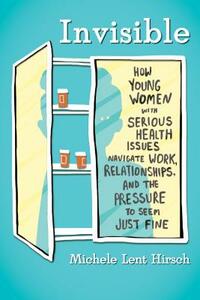Take a photo of a barcode or cover
challenging
emotional
informative
slow-paced
Solid for the most part, though the ending could have used a little more wrap-up - the last chapter felt very rushed. It's a good overview of the shit you go through when you're a sick person, though, especially for people who have never experienced illness (I would think... I'm chronically ill, so I can't say for sure, but I DO know that I'd probably be okay with handing this book to some folks in my life who've never experienced any medical issues).
challenging
reflective
slow-paced
A female scientist studying rats and their reaction to certain stimuli asks a simple question of her colleagues and this pretty much sums up my entire life's experience with the field of medicine:
But, she says, “every time I ask the question, ‘Well, have you looked at females?’ there’s always this, ‘Well, females are too complicated.’ I’ve gotten that answer for almost forty years now."
This book made me furious. And then upset. And then furious again, finally ending in a fit of despair, wondering, if ever things will change for any woman trying to simply find out "what the hell is wrong with me and can you fix it or at least give me the tools to live some semblance of my life?" There's this ugly, shitty stigma attached to having long term health issues when you're young. It doesn't matter how great and good-hearted you think your friends and colleagues are- odds are, if you tell them, they will turn on you like a pack of ravenous wolves. (Don't even get me started on mental health, that's a whole other book.) What it comes down to is this: if you are sick, and a woman, you are automatically invisible to society. The message is "We don't want you. We don't want to see you, we don't want you to remind us that we can get sick and die too. Go away." It's disgusting. But it's reality.
This is not a deep, scientific study with a massive list of citations (although there's quite a lot of those there anyways). What this is, is a very good writer with firsthand experience of navigating the utter mess of not just any healthcare system, but the US healthcare system, and as a queer woman to boot. She includes a lot of firsthand accounts from other women in similar circumstances, from all kinds of diverse backgrounds. It was passionate, well paced, and just when I was sitting there getting very annoyed and thinking "but at least your doctors believe you, girl" then she let rip in a whole chapter on medical professionals not believing female patients and I was waving this book out the window singing "say it louder" followed by a lot of expletives. I have spent more time making up excuses to not go to the doctor when I was in severe pain, simply because I was more afraid of the crushing disappointment and psychological torture of them not believing me, then of just putting up with the pain itself.
This felt like an excellent article you'd read in the New Yorker turned into book form and it was done beautifully. It's not in depth, no. It's not massive and deeply researched. But it will get you thinking. It will get you fired up. And if you have dealt with any of this bullshit, I really hope you can get those close to you to read it, so they can start to understand what you have to deal with on a daily basis. Highly recommend it, and then please do go on and read more of the myriad other books on this same subject, because there's more. Tip. Of. The. Iceberg. And if you're a medical professional? Listen to your patients. Your women, trans, bipoc, differently abled, LGBTQ patients. Please.
But, she says, “every time I ask the question, ‘Well, have you looked at females?’ there’s always this, ‘Well, females are too complicated.’ I’ve gotten that answer for almost forty years now."
This book made me furious. And then upset. And then furious again, finally ending in a fit of despair, wondering, if ever things will change for any woman trying to simply find out "what the hell is wrong with me and can you fix it or at least give me the tools to live some semblance of my life?" There's this ugly, shitty stigma attached to having long term health issues when you're young. It doesn't matter how great and good-hearted you think your friends and colleagues are- odds are, if you tell them, they will turn on you like a pack of ravenous wolves. (Don't even get me started on mental health, that's a whole other book.) What it comes down to is this: if you are sick, and a woman, you are automatically invisible to society. The message is "We don't want you. We don't want to see you, we don't want you to remind us that we can get sick and die too. Go away." It's disgusting. But it's reality.
This is not a deep, scientific study with a massive list of citations (although there's quite a lot of those there anyways). What this is, is a very good writer with firsthand experience of navigating the utter mess of not just any healthcare system, but the US healthcare system, and as a queer woman to boot. She includes a lot of firsthand accounts from other women in similar circumstances, from all kinds of diverse backgrounds. It was passionate, well paced, and just when I was sitting there getting very annoyed and thinking "but at least your doctors believe you, girl" then she let rip in a whole chapter on medical professionals not believing female patients and I was waving this book out the window singing "say it louder" followed by a lot of expletives. I have spent more time making up excuses to not go to the doctor when I was in severe pain, simply because I was more afraid of the crushing disappointment and psychological torture of them not believing me, then of just putting up with the pain itself.
This felt like an excellent article you'd read in the New Yorker turned into book form and it was done beautifully. It's not in depth, no. It's not massive and deeply researched. But it will get you thinking. It will get you fired up. And if you have dealt with any of this bullshit, I really hope you can get those close to you to read it, so they can start to understand what you have to deal with on a daily basis. Highly recommend it, and then please do go on and read more of the myriad other books on this same subject, because there's more. Tip. Of. The. Iceberg. And if you're a medical professional? Listen to your patients. Your women, trans, bipoc, differently abled, LGBTQ patients. Please.
challenging
emotional
informative
sad
medium-paced
This was very, very good. I identified with the chapters on work, friendships, and trying to figure out if a small human fits into my unpredictable life the most. As others have said, Invisible doesn’t discuss long-term chronic illnesses as much, and I wish it did- having cystic fibrosis hasn’t shifted my perspective. It’s formed it. I’ve never known life without it, and so I don’t miss or grieve something I used to know.
I read the line “Being sick involves a recognition of the worlds of pain and suffering, possibly even if death, which are normally only seen as distant possibilities or the plight of others” twice, three, four times.
As I thought about work tomorrow, I challenged my own perceptions about not doing enough and having to show up and being ashamed I can’t do enough/more/it all.
I can tell I’ll be thinking about this book for a long time.
I read the line “Being sick involves a recognition of the worlds of pain and suffering, possibly even if death, which are normally only seen as distant possibilities or the plight of others” twice, three, four times.
As I thought about work tomorrow, I challenged my own perceptions about not doing enough and having to show up and being ashamed I can’t do enough/more/it all.
I can tell I’ll be thinking about this book for a long time.
This book was a hard read because it triggered so many issues for me, but it is such a valuable book. It was reassuring to know I’m not alone but heartbreaking and enraging at times to see what other young women have endured. I wish I could give it to everyone in my life who struggles to understand invisible illness. Highly recommend.
3.5; I wish this had dug a little deeper into the subject at hand. I also feel like fatphobia in the medical world could have been touched on and the stigma that fat disabled people deal with at every visit. There was a lot of good info in this, but there could have been more.
I'd like to make this required reading for everyone in my life.
Equal parts informative, evocative, and infuriating, this book puts women's stories of serious health issues into the context of culture, research, and healthcare. It offers a peek into the lives of young women whose lives have been threatened and articulates the nuances of varied experiences, including those complicated by other marginalized identities. As an advocate for women's health and a woman with chronic conditions, I highly recommend this for anyone ready to learn about these issues or needing to feel seen in the midst of them.
adventurous
challenging
dark
emotional
hopeful
informative
inspiring
reflective
medium-paced
Moderate: Ableism, Body shaming, Cancer, Chronic illness, Infertility, Mental illness, Sexism, Sexual violence, Terminal illness, Torture, Transphobia





